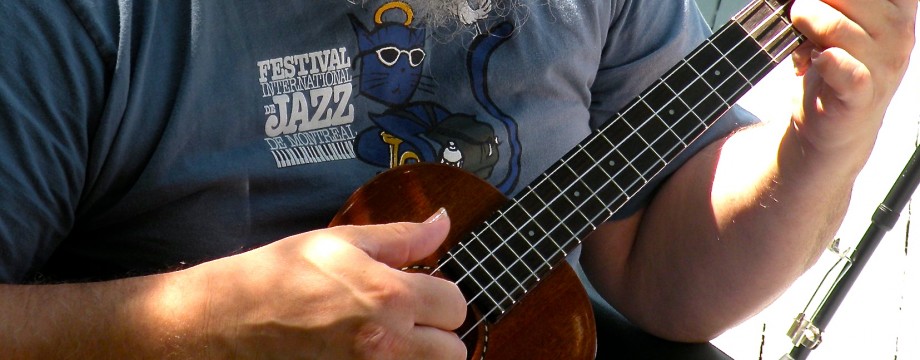Have another question? Click here.
The ukulele, a small instrument with four strings and a short neck, originated in Europe and was introduced to Hawaii in 1879 when a Portuguese immigrant named Joao Fernandez jumped off the boat and started strumming and singing with his branguinha (a small guitar-like instrument, sometimes called a machete). The crowd of Hawaiians there, were so impressed by his fingerboard prestidigitations that they called the instrument “ukulele,” which translates to “jumping flea.” Fernandez and the instrument became a local sensation, and the reigning Hawaiian monarch Kalakaua even learned how to play it. By 1900, the sound of the ukulele was ubiquitous across the Islands, where it was pronounced by Hawaiians as “oo-ku-lay-lay.” The ukulele has now gained tremendous popularity all over the world. ADUS meetings are free of charge. There is absolutely no obligation. Why not bring a ukulele with you and play along with us? If you prefer, just come and sing along to the tunes and experience the fun. We might even have a couple of spare ukes for you to try. Not right away. Just show up and we’ll let you try some of our spare ukuleles. You’ll learn about the different sizes and what to look for when buying. Our members love showing off their ukuleles. Give it a try and see if you like the instrument. I bet you will though. Yes, you definitely need to practice! Ukulele playing is very much about muscle memory, so it’s really important that you practice at home between our jam sessions. Through regular practice, your fingers learn to move to the right place at the time when you want them to. Joining ADUS is simple. Just mouse over the “Membership” heading above and then click on “Registration. Fill out the form and submit your payment. That’s it! You will be given login information in no time at all. You can also pay for your membership at the meetings, if you like. Not a problem. Just show up! everyone is welcome. We’ll teach you at least 2 chords on your very first visit. Soon enough, you’ll learn more chords and muscle memory will kick in. Our members are accepting and encouraging. Beginners often feel that a certain level of proficiency is required before participating. Not true. Just come and let the group inspire you to play. Proficiency will happen at it’s own pace…and you’ll be smiling during the entire ride. Age is not an issue. The ukulele is easy to learn but difficult to master. Practice is of course required but you’ll be surprised at how rapidly you learn. Some of our older members have absolutely stolen the show at our concerts. Here are some suggestions for additional equipment. An electronic tuner is a great idea. You can buy a clip-on or you can use a free app on your smartphone. A humidifier inside your case is another great idea. It will prevent cracking during the dry winter season. The OASIS ukulele Humidifier is our recommendation. It costs about $20. Make sure to read the instructions for this humidifier. Hard cases retain humidity much better than soft cases. They also offer significantly more protection from damage. Consequently, we recommend buying a hard case. A portable music stand is a also a good idea. Lastly, a ukulele strap that holds up the ukulele, allows your chording-hand to be significantly more relaxed. You just twist those turny things until it sounds good. Seriously, the most popular tuning for the soprano and concert ukuleles is gCEA, known as “reentrant C tuning” because the G string is tuned one octave higher than what you would expect.(Soprano ukuleles almost always have this kind of tuning.) Many players myself included, prefer a “Low G” tuning (also called “linear C”). Here the G string pitched below the C. With this type of tuning, you get an extended range especially when playing longer-necked ukes such as concerts, tenors, and baritones. Speaking of baritones, those are usually tuned to DGBE, exactly like the four top strings of a guitar.

